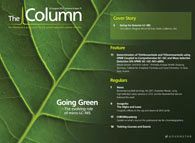Neanderthal nibbles
Once thought to be predominantly meat-eaters, evidence has come to light that reveals that Neanderthals were aware of the beneficial properties of plants.
Once thought to be predominantly meat-eaters, evidence has come to light that reveals that Neanderthals were aware of the beneficial properties of plants.1
The team, led by Karen Hardy, examined a site in El Sidrón, Spain, where the fossilized remains of five Neanderthals have been found. Using thermal desorption‑gas chromatography-mass spectrometry (TD-GC–MS) and pyrolysis-gas chromatography-mass spectrometry (Py-GC–MS), the team examined the ten teeth samples that had been collected. The results revealed a combination of wood smoke and bitumen or oil shale and the ingestion of a range of cooked plant foods. These surprising results reveal that Neanderthals had some knowledge of a variety of plant species. Two of the plant elements found, yarrow and chamomile, could potentially have been ingested for their medicinal qualities.
The team concluded that they had produced the first evidence for the use of medicinal plants by a Neanderthal individual. In addition, the varied plants that they uncovered suggested that the Neanderthal occupants of El Sidrón had a sophisticated knowledge of their natural surroundings which included the ability to select and use certain plants for their respective properties.
1. Karen Hardy et al., Naturwissenschaften, 99(8), 617–626 (2012).
This story originally appeared in The Column. Click here to view that issue.
Removing Double-Stranded RNA Impurities Using Chromatography
April 8th 2025Researchers from Agency for Science, Technology and Research in Singapore recently published a review article exploring how chromatography can be used to remove double-stranded RNA impurities during mRNA therapeutics production.











